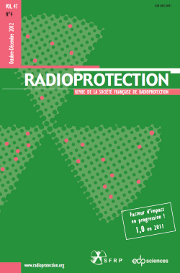Crossref Citations
This article has been cited by the following publications. This list is generated based on data provided by
Crossref.
Smith, Jim T.
and
Beresford, Nick A.
2005.
Chernobyl — Catastrophe and Consequences.
p.
289.
Shtangeeva, Irina
2008.
Trace Elements as Contaminants and Nutrients.
p.
295.
Shtangeeva, I.
2010.
Uptake of uranium and thorium by native and cultivated plants.
Journal of Environmental Radioactivity,
Vol. 101,
Issue. 6,
p.
458.
Kirichenko, Vladimir A.
Kirichenko, Alexander V.
and
Werts, Day E.
2012.
Consequences and Countermeasures in a Nuclear Power Accident: Chernobyl Experience.
Biosecurity and Bioterrorism: Biodefense Strategy, Practice, and Science,
Vol. 10,
Issue. 3,
p.
314.
Keum, Dong-Kwon
Jun, In
Lim, Kwang-Muk
Choi, Yong-Ho
and
Howard, Brenda J.
2013.
Time-dependent transfer of 137Cs, 85Sr and 65Zn to earthworms in highly contaminated soils.
Journal of Environmental Radioactivity,
Vol. 126,
Issue. ,
p.
427.
Penrose, Beth
Beresford, Nicholas A.
Crout, Neil M. J.
Lovatt, J. Alan
Thomson, Russell
Broadley, Martin R.
and
Baxter, Ivan
2017.
Forage grasses with lower uptake of caesium and strontium could provide ‘safer’ crops for radiologically contaminated areas.
PLOS ONE,
Vol. 12,
Issue. 5,
p.
e0176040.
Mikhailovskaya, Ludmila N.
Pozolotina, Vera N.
and
Antonova, Elena V.
2018.
Behaviour of Strontium in Plants and the Environment.
p.
61.
Mikhailovskaya, L. N.
Guseva, V. P.
Rukavishnikova, O. V.
and
Mikhailovskaya, Z. B.
2020.
Technogenic Radionuclides in Soils and Plants of Terrestrial Ecosystems in the Zone of Impact from Nuclear Enterprises.
Russian Journal of Ecology,
Vol. 51,
Issue. 2,
p.
127.
Gil-Pacheco, E.
Suárez-Navarro, J.A.
Fernández-Salegui, A.B.
Sánchez-González, S.M.
Suarez-Navarro, M.J.
and
García-Sánchez, A.
2021.
Factors that influence the absorption of uranium by indigenous plants on the spoil tip of an abandoned mine in western Spain.
Science of The Total Environment,
Vol. 759,
Issue. ,
p.
143571.
Mikhailovskaya, Ludmila N.
Pozolotina, Vera N.
Modorov, Makar V.
Kukarskih, Vladimir V.
Guseva, Valentina P.
Mikhailovskaya, Zinaida B.
and
Shimalina, Nadezhda S.
2022.
Accumulation of 90SR by Betula pendula within the East Ural Radioactive Trace zone.
Journal of Environmental Radioactivity,
Vol. 250,
Issue. ,
p.
106914.
Mikhailovskaya, L. N.
Pozolotina, V. N.
and
Mikhailovskaya, Z. B.
2024.
Aggregated Transfer Factors of 90Sr in Woody Plants in the Area Influenced by a Nuclear Facility.
Russian Journal of Ecology,
Vol. 55,
Issue. 5,
p.
323.
Mikhailovskaya, L. N.
Pozolotina, V. N.
and
Mikhailovskaya, Z. B.
2024.
Aggregated transfer factors of <sup>90</sup>Sr in woody plants in the zone.
Èkologiâ,
p.
342.
Chebotina, M. Ya.
Guseva, V. P.
and
Berzin, D. L.
2024.
Radioecological Studies of the Lake Frog in the Reservoirs of the Middle Urals.
Biologiâ vnutrennih vod,
p.
469.
Chebotina, M. Ya.
Guseva, V. P.
and
Berzin, D. L.
2024.
Radioecological Studies of the Marsh Frog in Reservoirs of the Middle Urals.
Inland Water Biology,
Vol. 17,
Issue. 3,
p.
483.


